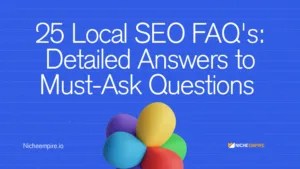As of the end of 2024, over 400 million websites use WordPress, according to Wpzoom, making WordPress one of the most popular content management systems.
WordPress websites are simple and flexible, making them a favorite for businesses, bloggers, and developers. Despite its advantages, many WordPress website owners find it hard to optimize their sites.
They might struggle with resolving errors, slow speed, poor indexing, and poor structure, which can negatively impact traffic and rankings. If this applies to you, you’re in the right place.
Whether for a new website or refining your site, our technical SEO for WordPress guide helps your website function optimally.
From safe data storage to user requests and experience, you will get practical SEO tips for your website backend to improve search engine rankings.
Overview
- What is Technical SEO?
- Why Makes Technical SEO for WordPress Important?
- The Difference Between Technical SEO, On-Page, and Off-Page SEO
- Step-by-Step Guide for Technical SEO for WordPress
- Extra Tips for Web Hosting and SEO-Friendly Theme
- Conclusion
- FAQs
What is Technical SEO?
Technical SEO is optimizing your website’s backend to increase its ranking on search engines. These behind-the-scenes components power your website’s functions; they include server, storage, and application interface.
Technical SEO increases page speed and provides a roadmap that makes it easier for search engines to crawl and index your web pages.
Why Makes Technical SEO for WordPress Important?
Technical SEO is vital for your WordPress websites because it improves your site’s performance by ensuring it runs smoothly and is easily discovered by search engines.
Without implementing technical SEO, your best-written content will not get the visibility it deserves. That’s because your website will have poor user experience and low traffic and will not rank high on search engines.
While it’s not difficult to manage your pages, posts, and images on WordPress, you will need to know how to go about it.
Here’s all to know about WordPress SEO.
The Difference Between Technical SEO, On-Page, and Off-Page SEO
It’s not unusual to mix these terms up. Though they work together to improve your website’s visibility and ranking on search engines, they differ.
- Technical SEO optimizes the backend of your website, like site speed, security, and crawlability.
- On-page SEO improves your web content and structure with relevant keywords, meta tags, and images.
- Off-page SEO involves building your website’s authority and credibility through external factors like backlinks and social media signals.
Find out more about the difference between on-page and off-page SEO.
Step-by-Step Guide for Technical SEO for WordPress
Here are technical SEO steps to improve your site’s performance and rankings on search engines.
1. Choose the Right Hosting
This is often overlooked, but it is crucial because the host of your WordPress site impacts your site’s speed, security, and reliability.
It also influences your website user’s experience and SEO rankings. You must get your hosting right to ensure your website’s smooth performance, security, and scalability.
Types of WordPress Hosting
Shared Hosting: More than one website can share one server with this hosting. It is affordable but slower, often less secure, and ideal for beginners on a tight budget.
VPS Hosting: VPS hosting provides a dedicated portion of a server for your website. It’s more reliable, has better security, and is also scalable.
Dedicated Hosting: Here, your website has the entire server and provides more control, high speed, and security. It’s great for businesses with high traffic but is more expensive.
Managed WordPress Hosting: This is optimized for WordPress websites. They are easy to use, have backups, enhanced security, and WordPress support.
Cloud Hosting: Cloud hosting stores your site’s data on third-party remote servers. They are flexible, cost-effective, flexible, and reliable.
Our List of Recommended WordPress Hosting
Here are some hosting you can use for your WordPress website.
- Bluehost
- SiteGround
- WP Engine
- Hostinger
- HostGator
- DreamHost
Learn more about WordPress hosting for SEO.
2. Use SEO-Friendly WordPress Theme
According to Wpzoom, WordPress has over 30,000 themes in its official theme repository. Some of these free themes provide a wide range of website design options.
With so many choices, selecting the right theme is essential for your site’s performance, security, and SEO.
Our Recommended SEO-Friendly Themes
Astra: It is lightweight, fast, and customizable for SEO.
GeneratePress: This theme is simple, fast, and works seamlessly with various page builders.
OceanWP: This multipurpose theme contains many demo templates that are great for responsive websites.
Hello Elementor: A simple theme designed for Elementor users that offers a blank canvas for your website’s custom layouts.
Neve: This theme is quick-loading and is excellent for mobile-first websites.
More details on the best SEO WordPress theme.
3. Install Essential Plugins for SEO
The right plugins improve your WordPress site’s SEO. They simplify your site’s optimization tasks like meta tag management, sitemaps, and rich snippets. All of these are important for search engine ranking.
WordPress Plugins like Yoast SEO or Rank Math work well for on-page SEO; they automate XML sitemaps and add rich snippets for better search results.
Also, WP Rocket improves site speed, another critical ranking factor. These plugins can make your site more SEO-friendly without needing technical expertise.
4. Optimize Your Website URL Structure
URL is essential for your web visitors and search engines. A clean and straightforward URL structure reveals what your page is about, and readers can know what to expect.
It also helps search engines crawl and index your site more effectively.
Let’s consider these URLs.
- www.nicheempire.com/p=123
- www.nicheempire.com/technical-seo-for-wordpress
The latter clearly shows the content of the page. It is descriptive and includes keywords that can improve your website’s SEO.
How to Optimize Your Website URL
- Keep your URLs short
- Include keywords
- Separate words with hyphens (not underscores)
- Avoid special characters
- Use a consistent URL structure
A well-structured URL improves your website’s visibility, user experience, and search engine rankings.
5. Improve Your Website Performance
People will get frustrated and leave your website if it loads slowly. This will increase the bounce rate, which can affect your search rankings.
If your website loads fast, it keeps your visitors engaged and improves your page’s ranking.
Tips for Improving Site Speed and Performance
- Compress Your Website Images
Images take up much space and can slow down your site. Use tools like TinyPNG or plugins like Smush to reduce file size while retaining quality.
- Install a Caching Plugin
Installing plugins like WP Rocket makes your website load faster.
- Enable a Content Delivery Network (CDN)
Services like Cloudflare can speed up your content delivery. CDN is a group of regionally distributed servers collaborating to make content delivery quick and more efficient.
- Use only Lightweight Themes
Fast themes like Astra or GeneratePress improve your website’s performance.
- Reduce Redunctant Plugins
Lighten your site by removing unnecessary plugins.
- Reduce Redirects
Improve your website’s loading time by avoiding too many redirects.
- Update Your Site Regularly
Ensure your WordPress themes and plugins are up-to-date.
Check our WordPress SEO checklist.
6. Make Your Website Mobile-Friendly
As more people use their phones to search online, your website must be mobile-friendly. Unsurprisingly, 54% of website traffic comes from mobile phones(WebFx).
A mobile-friendly site is a critical SEO factor. It improves user experience, lowers bounce rates, and, as a result, can boost your search engine rankings.
Ways to Make Your Website Mobile-Friendly
- Use a responsive theme that fits all device screens
- Compress images for faster mobile loading
- Use Google’s Mobile-Friendly Test to confirm site speed
- Make your site menus and buttons easy to use
- Turn on accelerated mobile pages to quicken loading on mobile
7. Secure Your Website
HTTPS secures your site by encrypting data, protecting visitors’ information, and promoting trust. Also, search engines like Google rank HTTPS sites higher, making it essential for effective SEO.
- To enable HTTPS, get an SSL certificate from your hosting provider. Once installed, update your WordPress settings and redirect all traffic from HTTP to HTTPS.
It will enhance user trust, keep your site safe, and improve SEO.
8. Generate XML Sitemaps
XML sitemaps enable search engines to easily find and index your content more efficiently. They do so by mapping your website’s structure, ensuring that all important pages are crawled and ranked.
You don’t have to do much here; WordPress automates basic sitemap generation and won’t need a separate plug-in. However, for large websites, new websites, and websites with frequent publications, plugins like Yoast SEO or Rank Math help create XML sitemaps.
They will improve your website visibility and SEO effort and simplify the process of submitting your sitemap to search engines.
9. Add Schema Markup
Schema markup is code that helps search engines understand your web content better. It makes displaying rich results such as ratings, reviews, and events easier on search engines.
Adding schema also improves your website’s click-through rates(CTR) and visibility. SEO plugins like Schema Pro or Yoast SEO can easily add schema markup to your WordPress site.
10. Fix Common Technical SEO Issues
Errors are bound to occur on websites, and it’s not different for WordPress sites. Addressing common technical SEO issues is key to boosting your website’s performance.
It could be slow speed, broken links, or duplicate content; these can negatively impact your rankings. You can find these and more issues on Google Search Console. It will help you resolve these website problems.
Addressing your website issues ensures search engines can improve the crawling and indexing of your pages. It also enhances user experience and SEO.
Read our article on Technical SEO audit to learn more.
11. Keep WordPress Updated
Updating your WordPress website regularly is crucial to maintain your site’s security and performance. This goes on to improve its search rankings. Update to add new and improved features and for security flaws.
Keeping WordPress updated is essential for your website’s security, overall performance, and SEO.
Extra Tips for Web Hosting and SEO-Friendly Theme
Here are factors to consider for your website hosting and theme.
What to Consider in Choosing Web Hosting
- Speed
A fast-loading website will make your visitors enjoy your site. Choose a host with quick servers and features such as caching and content delivery networks (CDN).
- Uptime
Ensure your hosting provider offers 99.9% uptime. This will prevent your website from experiencing downtime or outage and make it available and accessible to your web visitors.
- Security
Choose a host with built-in security features for SSL certificates, malware protection, and backups.
- Support
A responsive customer support team is essential for dealing with technical issues. Your choice of hosting should readily provide support.
- Scalability
At first, your website might have low data and traffic, but as it grows, the hosting must be able to handle it.
- Price and Quality
While there are affordable options, balancing cost with quality is crucial. Let the features and function of your website guide you, but don’t compromise on performance and security.
Related Post: WordPress SEO Tips for Higher Ranking
Factors to Consider When Choosing an SEO-Friendly Theme
- SEO-Friendly Code
Themes with clean, fast-loading code help search engines crawl your site efficiently. These lightweight themes have minimal codes; they reduce server load and ensure your website is stable.
- Mobile Friendly
The theme has to be suitable for all screen sizes, as Google prioritizes mobile-first indexing.
- Speed Optimization
Choose lightweight themes for fast loading times; this is crucial for SEO. Check theme reviews for page speed and performance and test them on different browsers and devices.
- Regular Updates
The theme should be regularly updated to stay compatible with new WordPress features and security standards.
- Customization Options
Themes that are flexible in design and functionality improve your website but ensure it is SEO-friendly.
This Might Interest You: Local SEO for WordPress
Conclusion
Whether you have a blog or an ecommerce website, technical SEO for WordPress is essential. It improves your site’s performance, visibility, and rankings on search engines.
Use this simple step-by-step guide to ensure your website is fast, user-friendly, mobile-friendly, and secure.
Get started today, boost your SEO, and watch your site grow.
FAQs
Do I need an SEO plugin for my WordPress website?
SEO plugins are beneficial; they provide comprehensive features like meta tag management, XML sitemaps, and site analysis, making website optimization easier.
SEO plugins like Yoast SEO, Rank Math, and All in One SEO Pack are effective for WordPress.
How often should I conduct a technical SEO audit on my WordPress site?
Conduct a technical SEO audit on your WordPress site every 3-6 months. However, if you make significant changes or updates to your site, you may have to audit more frequently.
Use our SEO audit template to get started.
Which hosting is best for WordPress SEO?
Several hosts are suitable for WordPress SEO; your choice will depend on your site data, features, and other factors.
SiteGround, Bluehost, and WP Engine offer high uptime, fast speeds, and strong security, which are crucial for improving SEO performance.
What WordPress theme is best for SEO?
The best WordPress themes for SEO include Astra, GeneratePress, and OceanWP. These themes are lightweight, fast-loading, and can improve your site’s SEO performance.



